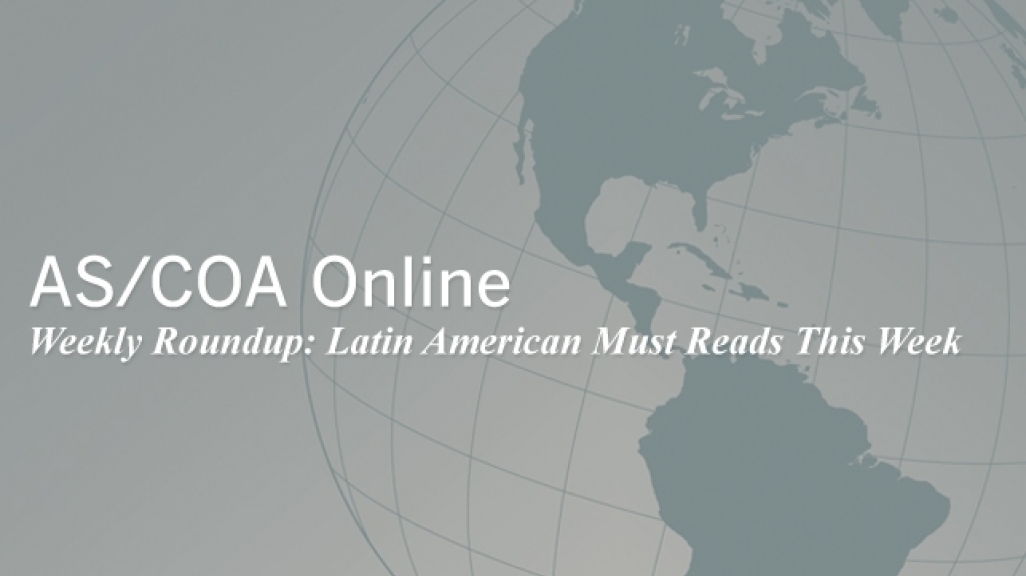Weekly Roundup: Venezuela's Credit Rating, Brazil's Polls, Ranking LatAm Well-Being
Weekly Roundup: Venezuela's Credit Rating, Brazil's Polls, Ranking LatAm Well-Being
The U.S. president nominates a new ambassador to Mexico, Colombia’s Senate debates a former president’s paramilitary ties, and a new survey shows U.S. electoral divisions on immigration. Read these stories and more.
Brazilian Presidential Polls Show Tie in Potential Runoff
This week, candidates took part in the third presidential debate of the campaign, with heated discussion on the recent scandal involving Brazil’s state-run oil company. Meanwhile, polls show a close race leading up to Brazil’s October 5 vote. A September 16 Ibope survey shows Brazilian President Dilma Rousseff with 36 percent, having lost three points since the previous survey. Marina Silva, at 30 percent, lost one point, while Aécio Neves—at 19 percent—gained four points. In the case of a runoff, the poll shows Rousseff and Silva statistically tied. A September 19 Datafolha survey shows Silva declining three points since the last poll, and gives Rousseff a seven-point lead. It also shows both candidates statistically tied in a second round.
Read about how Brazil’s presidential candidates are turning to social media to win over voters.
Obama Nominates Ambassador to Mexico; Senate Confirms Ambassador to Guatemala
On September 18, U.S. President Barack Obama announced he would nominate Maria Echaveste as ambassador to Mexico. If confirmed by Congress, she would become the first woman to serve that post. She would also be the first ambassador “with deep ties to immigrant-run organizations,” the Wilson Center’s Andrew Selee told The Dallas Morning News.
Also this week, the U.S. Senate confirmed Todd Robinson as the country’s ambassador to Guatemala. A career foreign service officer, Robinson previously worked in Guatemala as the deputy chief of mission from 2009 to 2011. In his confirmation hearing, Robinson said one of his top priorities would be working with the Guatemalan government to address the flow of child migrants out of the country.
In Colombia, Uribe Questioned about Alleged Paramilitary Ties
On September 17, Senator Álvaro Uribe—the former Colombian president—participated in a debate arranged by Senator Iván Cepeda about Uribe’s alleged ties to right-wing paramilitary forces and collaboration with drug traffickers. During the hearing, Cepeda presented documents and testimony from paramilitaries, which were dismissed by Uribe, who at one point left the building in protest. The Pan-American Post points out, however, that much of Cepeda’s testimony was already public knowledge.
Read about how Colombia’s conflict affects domestic politics in an Americas Quarterly feature.
S&P Downgrades Venezuela’s Credit Rating
On September 16, the rating agency Standard & Poor’s (S&P) downgraded Venezuela’s credit rating from B-minus to triple-C-plus. The agency said the downgrade was prompted by the current administration’s inability to control spiraling inflation and pay off its debt. The new rating indicates that the country has a 50 percent chance of defaulting on its sovereign debt in the next two years. Venezuela will have to pay a total of $7 billion in interest and bond maturities before the end of the year—equal to nearly half the money it will make from oil exports in that time, writes The Latin American Herald Tribune’s Editor-in-Chief Russ Dallen.
Mexican Political Parties Call for Referenda on Elections, Wages, and Energy
With the country’s popular consultation law in place after passage earlier this year, Mexican political parties are pushing for referenda on a number of issues. This week, Mexico’s ruling Institutional Revolutionary Party submitted a petition of over 6 million signatures to the Senate for a referendum to reduce the number of congressional seats elected by proportional representation. If passed, the initiative would do away with 100 of the 200 lower house seats and 32 Senate seats elected in this manner. Last week, the National Action Party submitted a petition of nearly 2.5 million signatures to the National Electoral Institute calling for a referendum to raise the minimum wage, while the Party of the Democratic Revolution submitted a petition of over 2.7 million signatures to hold a plebiscite on the country’s energy reform.
Read more about the possible energy reform referendum in an AS/COA Online hemispheric update.
Americans in Battleground Districts Divided on Parties’ Immigration Approach
A September 15 Politico poll of voters in competitive congressional districts found a higher level of approval for Republicans than Democrats on the issue of immigration. When asked which party they trusted more to handle immigration, 34 percent of respondents said they trusted Republicans more, as opposed to 31 percent who trusted Democrats more and 35 percent who were unsure. Around two-thirds say they support comprehensive immigration reform, and 75 percent said that immigration is a somewhat or very important factor in deciding on candidates.
Panama Tops Global Well-Being Index
The Central American country has the highest level of well-being in the world, according to the Gallup-Healthways Well-Being Index released September 16. The index ranks 135 countries using a self-reported data on “sense of purpose, social connections, community, finances and physical vigor,” rather than health or economic indicators.Seven countries in the Americas rank in the top ten, including Panama (1), Costa Rica (2), Brazil (5), Uruguay (6), El Salvador (7), Guatemala (9), and Canada (10).
See how Latin American countries rank in Americas Quarterly's 2014 Social Inclusion Index.
Costa Rica's Capital Begins Street Numbering
Costa Rica will launch a mass media campaign this year to promote the use of a new street-numbering system in the capital of San José, writes researcher Jorge Vega for Makeshift. Mail couriers lose around $720 million a year due to a lack of home addresses, which the government says wastes money and prevents emergency responders from arriving quickly.






